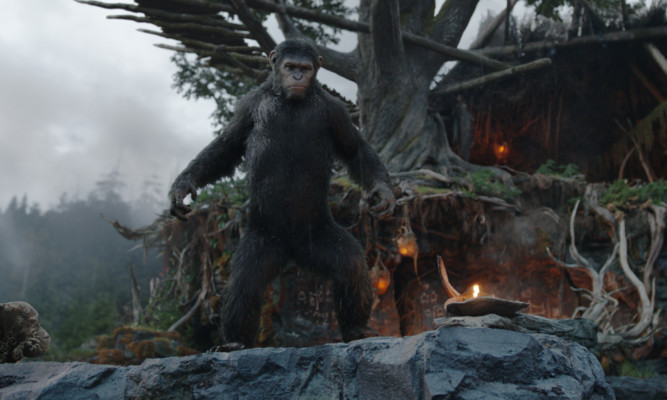
Andy Serkis turned 50 in April but has no intention to quit aping around.
The London-born actor has been a pioneer of motion-capture acting, the technique of creating a digitally animated character but using a human performer to give it movement and facial expressions.
This has allowed him to have a leading role in some of the biggest blockbusters of the past 15 years, including The Lord of the Rings trilogy, King Kong and Rise of the Planet of the Apes, but still be able to travel on the tube in his native city unmolested.
“People ask me to do Gollum’s voice to put as their answer phone message on their mobile,” he says of the extent his Lord of the Rings role has intruded on his private life.
He’s at it again in Rise’s sequel, Dawn of the Planet of the Apes, with the story having moved on eight years and the human race all but wiped out by a Simian Flu virus.
Andy plays Caesar, the ape who had his intelligence enhanced by an anti-Alzheimer’s drug in the first film (which is set 2,000 years prior to events in Charlton Heston’s Planet of the Apes).
Having broken free from their human captors, Caesar and his fellow genetically-evolved apes are now living a peaceful existence away from the surviving humans. Unfortunately for them, their homeland contains a dam which the humans need to help replenish their dwindling energy resources. But the apes fear their search for power will only trigger a desire for it in another sense of the word and an uneasy stand-off ensues, with Caesar who has a compassion for humans unusual in his species having been raised by them stuck in the middle.
“He’s still developing his ‘inner-ape’,” smiles Andy, who has three children with his actress wife, Lorraine Ashbourne. “He’s a natural leader. The other apes respect him because he has an innate sense of fairness. He values their opinions, and he includes them in the decision-making.
“He is responsible for the survival of a community but, on the other hand, he has empathy for humans, and still, deep down, feels a need to be able to communicate with them.”
The motion capture technology that Andy has made his own has followed a similar trajectory to the burgeoning colony of intelligent apes that appear in the film, with a growing number of actors looking to make use of it.
“I think it’s reaching a point where good actors who are interested in transformation, like Willem Defoe and John Malkovich, will do it,” Andy asserts. “They see the liberation this tool can give them.
“Other actors might feel that it has to be their face on the screen, and that’s up to them.”
Three years ago Andy, the son of an Iraqi father and English mother, started his own studio, Imaginarium, and is currently working on a new version of George Orwell’s Animal Farm.
He was also brought in to use his expertise on the new Star Wars movie, although he’s strictly forbidden from saying how, and has directed a new version of The Jungle Book, starring Scarlett Johansson and Idris Elba.
“Before I became an actor, I studied visual arts, so I painted and did graphic design. I’ve always had a visual perspective of things so it made total sense to move into directing.”
And if you think this is a technological innovation that moviemakers will soon grow tired of utilising, Andy has news for you.
“I don’t think it’s going to go away, as an art form, or whatever it is. I think it’s going to be present in story telling for the next 10, 20, 30 years,” he says.
Director Matt Reeves doesn’t just deliver a visually effective and exciting sequel, but also a thoughtful film that makes you wonder what it means to be human, and what separates us from the rest of the animal kingdom.
Reminiscent of George Orwell’s Animal Farm, Reeves cleverly includes hints of human culture in among Caesar’s growing colony, such as sharp spears, artwork and jewellery.
Eventually we see our simian friends develop a moral awareness, complicated by greed, jealousy, love and above all, a hunger for power. Their enhanced intelligence condemns them to become just like us.
This film will definitely appeal to movie goers, the 3D effects are second to none, and body language guru Andy Serkis depicts an ape to perfection.
But, moreover, Dawn of the Planet of the Apes is a dystopian story and a dream for evolutionists and human culturists alike.

Enjoy the convenience of having The Sunday Post delivered as a digital ePaper straight to your smartphone, tablet or computer.
Subscribe for only £5.49 a month and enjoy all the benefits of the printed paper as a digital replica.
Subscribe